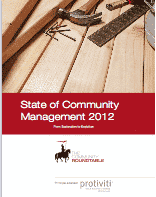
So, what are this edition’s take-aways ?
We can learn that communities have a growing importance in organizations even if external ones seem to be easier to implement than internal ones, for reasons I don’t think I have to list here one more time. Anyway, if the concepts seems to get clearer for anyone over time, organizations still struggle at implementation.
One of the major concern is to align communities with strategic business needs to optimize their contribution to reaching strategic goals and, in some ways, reassure leaders and managers.
Another concern is to integrate these communities into existing workflows and business processes. The community roundtable put together a quite exhaustive list of integration cases and the related benefits one can expect from it.
I’d like to enlarge a little bit on this point. Even if that may sound too purist or fundamentalist, it seems to me that the original concept of communities relies on voluntary participation of its members. If not, in my opinion, these are project groups or organized think tanks since they’re integrated into mandatory activities, what implies a specific form of management that are not community management. In my opinion this point is rather about social BPM, social project management etc. On the other hand we can imagine than mandatory activities are executed using, to make decisions and solve problems, contents and people from communities that do not involve the same people as the process does and where participation is voluntary. But in this case I’d rather call it articulation or joint-operation that integration. The difference matters and impacts the way the community framework will be designed and the social activities when be governed, depending on whether they’re embedded into a process or parallel to it. I’ll elaborate more on this matter later. Anyway, beyond this slight difference, it’s very important that enterprises get this need for integration, what was not obvious or clear at all (and sometimes sounded heretic) two years ago.
That said, the study presents an interesting approach by maturity level, drawing the path that starts with beginners and community-averse organisations and ends with networked organizations were communities is the way of doing and managing anything. What practitioners will love at first sight the to be able to find where they are on the path and find a list of things to do, matters to address, key success factors and even recommended books that match their level of maturity. This is really a praiseworthy intent because it’s clear that “rockstar cases”, even if they impress people, seem too far away from most practitionners’ situation who often think that the step is too high for them. So, having a referential that is taylored for their situation with realistic checkpoints will be much appreciated.
On more thing before I end. The community roundtable has enough experience and hindsight to have a clear idea of the time needed to go from one stage to another. This is another information I find essential and that will be very helpful for community managers because that will help them to set realistic goals and objectives and not panic if they don’t reach the graal in ten month. For example, each step lasts around 2 years…sometimes even 5 !
So, long is the road, what is one more reason to start as soon as possible, set reasonable goals and make one’s way quietly instead of shooting ahead, panic and fail.
Enjoy your reading !
2012 State of Community Management

